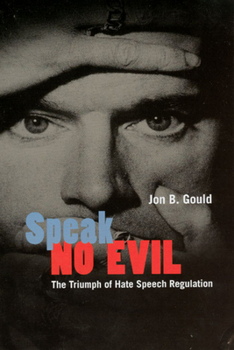Speak No Evil: The Triumph of Hate Speech Regulation
Opponents of speech codes often argue that liberal academics use the codes to advance an agenda of political correctness. But Jon B. Gould's provocative book, based on an enormous amount of empirical evidence, reveals that the real reasons for their growth are to be found in the pragmatic, almost utilitarian, considerations of college administrators. Instituting hate speech policy, he shows, was often a symbolic response taken by university leaders...
Format:Paperback
Language:English
ISBN:0226305546
ISBN13:9780226305547
Release Date:July 2005
Publisher:University of Chicago Press
Length:224 Pages
Weight:0.85 lbs.
Dimensions:0.7" x 6.1" x 8.8"
Customer Reviews
1 rating
Goodbye 'free speech zones'!
Published by Thriftbooks.com User , 19 years ago
Gould's comprehensive work explains how speech restrictions were introduced and thrive in the 'free' college campus. Supposedly implemented to protect students, these 'free speech zones' were really about following the lead of other schools who implemented them first. The free speech zones themselves emerged in the aftermath of the 1960s. Colleges presumed that if they could control where people were protesting, they could control the atmosphere of the protest---and prevent things from getting out of hand. The courts however are concerned that colleges acted in excess. The establishment of these zones was not legitmately connected to public safety. Furthermore, circumstances did not warrant a measure as severe as limiting the student body's constitutional right to free speech. Because universities cannot demonstrate how the restriction of adult's speech ultimately contributes to the free inquiry needed in post-secondary environments, free speech zones and the other restrictions are under fire. The petitioners allege that these restrictions violate their right to free speech. As 'offensive speech' is a largely subjective matter, today's protestor against 'hate speech' might very well find themselves being picketed for 'offensive speech' if these laws are to stand. Especially in the post-secondary environment, free speech restrictions stifle democracy, learning---and the very mission of the institutions. Yes, this means that people will periodically run into speech they find objectionable, but this is a rather insignificant price to pay for living in a democracy. Gould does not provide easy answers inside his work. Rather he wants the readers of this title to understand how having a monolithic blanket against the 'offensive' is an impossible policy to implement. What initially comforts us today might restrict us in the near future. Such is the difficulty of regulating speech. This work is important for academic libraries, but it is also a worthwhile read for civil libertarians, and activists. I would finally recommend that the local public library stock a copy because the First Amendment is so important to a free society.





